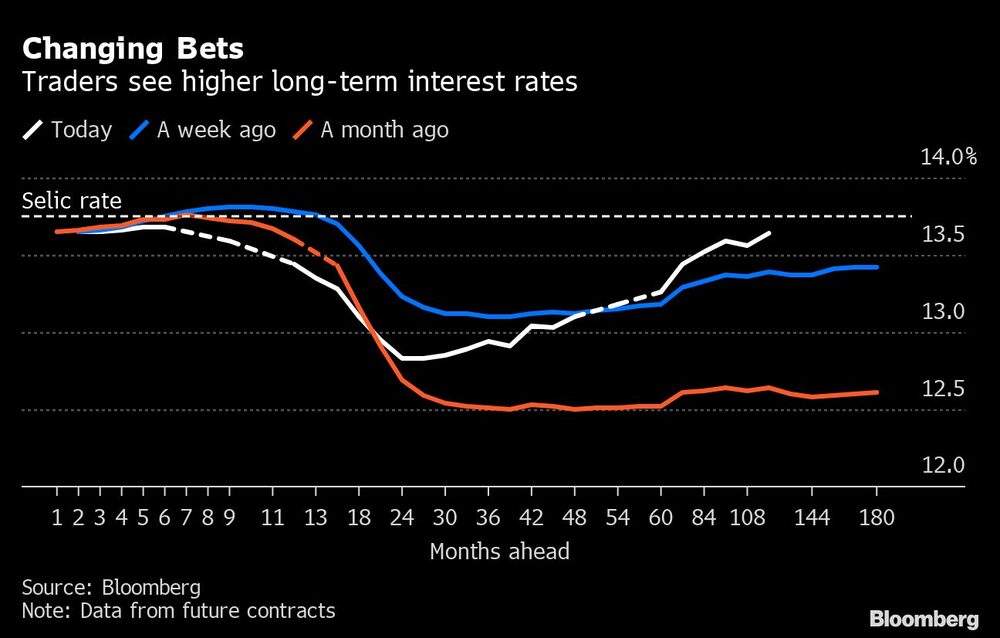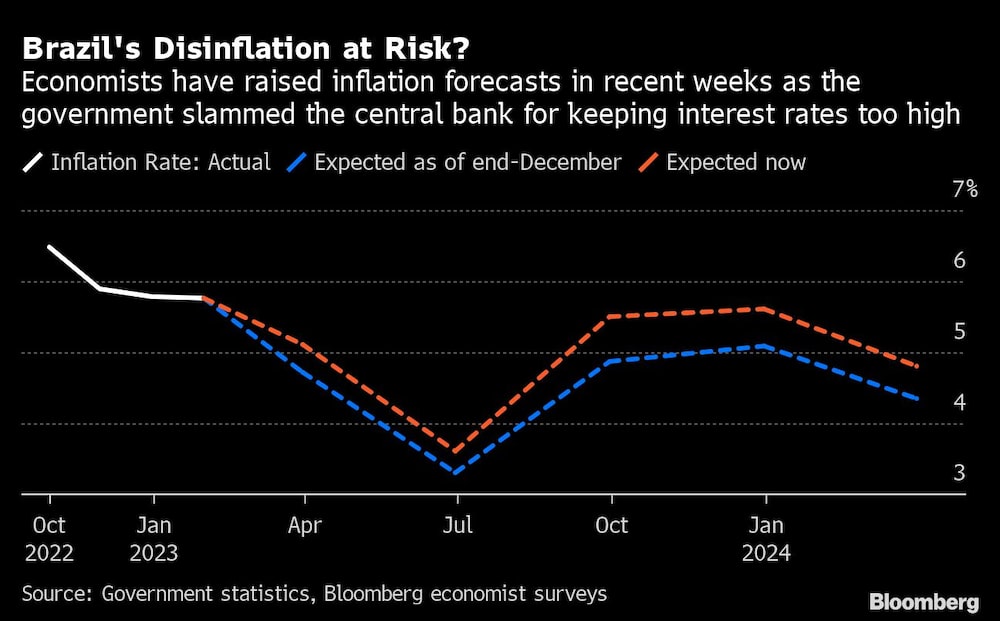Bloomberg — Investors are getting alarmed by the escalating fight over Brazil’s inflation targets — and they’re betting that the government’s drive for cheaper money will backfire.
Stock markets and the currency in Latin America’s biggest economy slumped Thursday after Bloomberg News reported that the administration of President Luiz Inacio Lula da Silva is pushing for an early review of the country’s inflation targets, with the intent of raising them.
Lula, who only took office last month, has spent weeks railing against the central bank’s 13.75% interest rate – the highest in six years. He wants to ramp up public spending, to kick-start an economy that’s barely growing, and sees high borrowing costs as an obstacle that can be removed by setting a looser inflation target. But since the sniping began, markets have been pricing in even higher interest rates — the opposite of what the president wants.

That shows how political attacks on the central bank for keeping rates too high can backfire, and instead “raise the hurdle” for the bank to start lowering them, says Adriana Dupita at Bloomberg Economics.
Various measures of expected inflation and longer-term interest rates have shifted higher since Lula began his campaign of criticism — which has also included some potshots at the central bank’s autonomy from politics, enshrined in the law just two years ago.
Economists surveyed by the central bank pushed back their forecast for the beginning of the monetary easing cycle by two months, to November. Some Wall Street banks are even more pessimistic, with Credit Suisse Group AG forecasting the first rate cut only in the third quarter of next year.

‘Not a Good Signal’
In Brazil, the central bank has autonomy to implement the policies it deems necessary to meet inflation targets, but it doesn’t set them. That’s the job of the national monetary council, a government body comprised of the finance and the planning ministers plus Roberto Campos Neto, the current central bank chief. That means Lula through his hand-picked cabinet members is likely to have a final say in the decision.
But even after the central bank missed inflation goals for two straight years — to be fair, most of its global peers also fell short — watering down the target now risks sowing suspicion that the government has given up on the fight.
“It’s not a good signal,” says Juan Prada, a strategist at Barclays Plc. Changing the inflation target at a time when price shocks are still coming in, and there’s so much uncertainty over the government’s spending plans, “puts the monetary regime into question,” he says.
And one likely consequence would be higher long-term interest rates to factor in the expectation that inflation will stick around, which won’t be much help for the growth and investment that Lula prizes.
None of this means that Brazil’s inflation goals – currently 3.25% for 2023, and 3% for the following two years – are necessarily the right ones for its economy.
There’s no precise science behind picking a target for inflation, and no consensus on the appropriate level. In the US and other advanced nations, for example, plenty of heavyweight economists reckon the 2% goals currently in force are too low.
‘Not Much Appetite’
In Brazil, the target was higher when Lula first came to office in the early 2000s, until the government began lowering it in 2019.
“Brazil lived with a 4.5% goal for a long time and in a reasonable way,” says Sergio Werlang, an economics professor who was the architect of the inflation-targeting regime. There’s a case for raising it again now, he said in an email, though any change should be “well communicated and preferably gradual” — and it would be better to wait until the fiscal outlook is “under control.”
After getting the green light for spending an extra 168 billion reais ($34 billion) this year, Lula is expected to put forward new budget rules to ensure the sustainability of public debt after the previous anchor, a spending cap adjusted annually by inflation, lost credibility among investors.
Raising the inflation target suggests the government will settle for a less ambitious fiscal rule to keep spending big, according to former central director Jose Julio Senna. “If the government changes the goal now, it signals there’s not much appetite for the spending cuts needed” to rein in consumer prices, he says.
The national monetary council traditionally sets inflation targets in its June meeting. Yet it is considering bringing forward this year’s discussion to also review nearer-term goals, according to two government officials with knowledge of the matter.
‘Tick All Boxes’
Right now, the hints about raising the target are a sign that Lula’s administration would tolerate more inflation as long as it allows for lower interest rates and faster growth.
That idea is familiar in Brazil. It was known as the “new economic matrix” under the government of Dilma Rousseff in the 2010s and it included more public spending and subsidized credit through state-owned banks. Efforts to turbocharge the economy back then ended with soaring inflation and a deep recession.
The “policies adopted and announced right now tick all those boxes,” said Alexandre Schwartsman, a central bank director during Lula’s first term.
Even economists who support higher targets typically argue against making the move when inflation is overshooting, because then it just looks like an admission of failure.
“The way to regain credibility is to bring inflation back to target,” Schwartsman says. Changing the goal instead, he says, would be like shooting oneself in the foot.
Read more at Bloomberg.com



